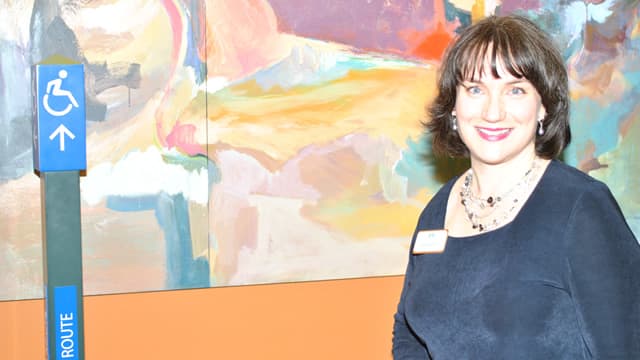
This year marks the 25th anniversary of the Americans with Disabilities Act (ADA); its passage enacted federally mandated, wide-sweeping changes in employment, transportation, communication and education, especially at the post-secondary level.
Gena Smith, director of disability services at UNC Charlotte, considers the ADA the broadest civil rights legislation of the 20th century.
“From the beginning, the ADA was about opening doors on campus – literally and figuratively,” said Smith. “Literally, colleges and universities had to be concerned with physical access – are doors wide enough to accommodate wheelchairs? And, then, figuratively, are the doors of the institution open to providing services to individuals with disabilities?”
Smith joined UNC Charlotte this past fall from Winthrop University, where she worked for 17 years as a program director for disability services. So, she is very familiar with the impact of the ADA in a collegiate environment.
“People with disabilities were on college campuses prior to the passage of the ADA – I have cerebral palsy, and I grew up with my disability and went to college and graduate school,” said Smith. “But the ADA encouraged more and more students to seek educational opportunities, because the law required all public universities to have an office that coordinated support and services for individuals with disabilities.”
According to Smith, roughly 11 percent of the U.S. college population has a disability, although not all students elect to connect with a disability services office at their institutions.
The UNC Charlotte Office of Disability Services works closely with students and faculty members to meet an individual’s documented need. For example, a student with a documented need may require a wheelchair-accessible desk, note takers in class, sign language interpreters, closed captioning for videos and assistive technology (screen readers, speech recognition, large keyboards, digital recorders, assistive listening devices, etc.).
Fewer physical barriers and increased support services have resulted in more persons with disabilities taking advantage of higher education opportunities. So, the ADA at 25 is seen by many to be a success, in that the law has opened more doors on college campuses.
But there are more doors to open, and colleges have to be ready for the shift in focus of the ADA, said Smith.
“Initially, we focused on learning and physical disabilities. We’ve corrected the widths of doors and added ramps, and while that work isn’t over, we are looking to a future in which more and more college students are arriving on campus with hidden disabilities,” Smith stated.
Chronic medical illnesses, mental health diagnoses, ADHD and other disabilities not readily evident are concerns that must be addressed by colleges nationwide.
A disability is a condition that has a major impact on one’s physical or psychological functioning – or both, said Smith. “On most college campuses, the largest, growing groups include mental health disorders and chronic medical illnesses.”
A graduate of Furman University, Smith completed a master’s degree in counseling and development from Winthrop.
During her first year at the University, she has had to adjust to a professional shift – the challenges inherent to working on an urban research campus with a student enrollment that is four times larger than her previous employer.
At UNC Charlotte, Smith oversees a Disability Services Office that includes an associate director, two assistant directors, an assistive technology specialist, an ADA project coordinator, a captionist, a student services specialist and a number of student employees.
“I loved Winthrop, but when I learned about this position’s availability I had to take a look. People attracted to this field often have a passion for it, and they stay in it for a long time. I’m excited by the opportunity to address new issues and work with a larger staff,” said Smith. “I still explain that I’m fairly new when I introduce myself on campus.”
And getting out and meeting people across campus has been a priority for Smith, and she noted she’s much more at ease and confident in responding to inquiries and assisting students or faculty.
“Working at the same institution for 17 years, you know who to call when an elevator breaks or which form to fill out if you need to submit a request,” Smith explained. “Here, I had to relearn much of that information, but everyone has been very helpful.”
As part of the interview process last year, Smith visited campus and discovered that UNC Charlotte was “very progressive in how it addressed disability services.” She said the work of her predecessor was evident, and she is excited at the challenge to build upon that foundation.
“Much has been accomplished here, especially within the last five years. But during the past year, we’ve rewritten our mission statement,” Smith explained. “We want to continue along the same course but with an eye to the future. In addition to ensuring access to education, we want to help persons with disabilities better engage with student life experiences on campus. We must look at the challenges and opportunities afforded by increasing numbers of transfer students and technological advances. We are retaining greater numbers of students, but we also have to continue to help them graduate and prepare them for the world beyond college.”